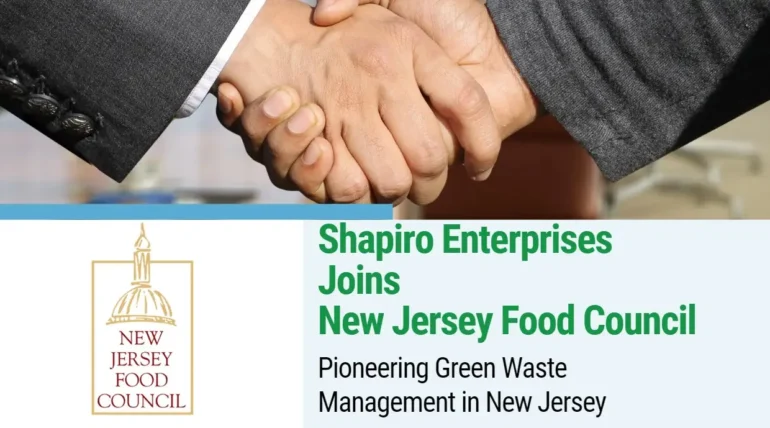Skip Shapiro Enterprises has officially joined the ranks of New Jersey Food Council members, strengthening its role in advancing sustainability across the state’s food industry. The New Jersey Food Council (NJFC) is the state’s primary trade association, representing food businesses of every scale across New Jersey.
The membership gives Shapiro a stronger platform to support New Jersey’s food waste management goals.
For the broader food community, it marks a step toward deeper collaboration and stronger sustainability practices across the state.
Key Takeaways
- Skip Shapiro Enterprises has joined the New Jersey Food Council, reinforcing its role in advancing sustainability in New Jersey’s food industry.
- The membership connects Shapiro with leading food and beverage companies across the state, opening opportunities for collaboration on waste management solutions.
- Shapiro brings expertise in organic recycling and liquid waste management, including food, beverage, alcohol, and ethanol byproducts.
- The company is leading the $440 million Linden Renewable Energy Project, designed to process 1,475 tons of organic waste daily and help businesses comply with state food waste laws.
- New Jersey businesses benefit through compliance support, reduced landfill use, cost efficiency, and contributions to renewable energy generation.
About the New Jersey Food Council
Founded in 1969, NJFC has become the hub of New Jersey’s food economy. It unites grocers, suppliers, manufacturers, and service providers to strengthen the industry and prepare it for the future.
New Jersey Food Council is a voice for its members. It champions smart policies in Trenton, keeps businesses ahead of regulatory changes, and creates spaces where industry leaders can share ideas and solutions. From networking events to workforce initiatives, the council is where business and advocacy meet.
For its members, NJFC creates opportunities to connect with decision-makers, collaborate on sustainability initiatives, and stay ahead in a rapidly changing market. With this membership, Shapiro Enterprises joins a network shaping the next chapter of New Jersey’s food economy.
Why Shapiro Joined NJFC
For Shapiro Enterprises, joining the New Jersey Food Council is a chance to expand its reach and deepen its impact. The membership allows Shapiro to work directly with food and beverage companies across New Jersey, creating space to exchange ideas and drive stronger waste solutions together.
It also gives Skip Shapiro Enterprises a platform to showcase its expertise among leading food waste recycling companies. By sharing proven strategies in organic recycling and liquid waste solutions, including the handling of food, beverage, alcohol, and ethanol byproducts, the company helps peers see how waste challenges can be transformed into opportunities for compliance and growth.
Membership also allows Shapiro to contribute more actively to discussions on sustainability and food waste policy, alongside the state’s leading food businesses.
This step fits naturally with the company’s sustainability mission. Both Shapiro and NJFC share a commitment to reducing waste, protecting resources, and building a healthier food economy for New Jersey.
“Joining the New Jersey Food Council allows us to stand shoulder to shoulder with the state’s leading food businesses as we work toward a more sustainable future. Our expertise in organic recycling and the Linden Renewable Energy Project will help members not only stay compliant with New Jersey’s food waste laws but also transform waste into real environmental value.”
— Skip Shapiro, Principal, Skip Shapiro Enterprises, LLC
Meet the Linden Renewable Energy Project
At the center of Shapiro’s sustainability efforts is the $440 million Linden Renewable Energy Project. When complete, it will be the largest food waste-to-renewable natural gas facility in the United States, designed to process up to 1,475 tons of organic waste every day.
The facility is built with a clear purpose: to help New Jersey businesses comply with food waste regulations. By turning organic material into renewable natural gas, it gives companies a reliable way to manage waste and reduce their environmental impact.

Source: South Jersey Industries (SJI)
For New Jersey Food Council members, the project brings measurable advantages:
- Significant reductions in landfill waste
- Lower disposal and hauling costs
- Renewable natural gas generation that supports cleaner energy across the state
The Linden NJ recycling center combines compliance support, cost savings, and sustainability outcomes, establishing a national benchmark for food waste management.
What This Means for NJ Businesses
New Jersey food companies are facing growing pressure to comply with strict recycling mandates while keeping costs under control. By joining the New Jersey Food Council, Shapiro Enterprises brings solutions that directly address these challenges and create new opportunities for businesses to thrive in a sustainability-driven market.
For New Jersey businesses, the partnership has direct implications:
- Compliance becomes easier to manage through services tied to the Linden Renewable Energy Project.
- Waste-to-energy options reduce landfill reliance and support statewide renewable energy goals.
- ESG reporting and sustainability performance gain credibility with measurable results, an area increasingly important to investors and retailers.
For NJFC members, the partnership provides a way to meet compliance requirements while maintaining operational efficiency and cost control. It also supports measurable sustainability improvements that can strengthen business performance over time.
Conclusion
Skip Shapiro Enterprises is proud to join the New Jersey Food Council. The membership expands Shapiro’s role in advancing sustainability across New Jersey’s food industry and opens new opportunities for collaboration.
Shapiro remains committed to helping businesses stay compliant, manage costs, and reach their sustainability goals. Companies across the state are encouraged to contact us to learn how smarter waste solutions can support their operations.
Frequently Asked Questions
Being a New Jersey Food Council member gives companies access to advocacy, networking, and industry updates that help them stay ahead of regulations and strengthen sustainability efforts.
Businesses can reach out through the Contact Us page to discuss recycling and waste management needs. Shapiro’s team will recommend practical solutions tailored to each operation.
The Linden Renewable Energy Project will be the largest food waste-to-renewable natural gas facility in the U.S., helping NJ businesses meet recycling laws while cutting landfill waste and producing clean energy.
As an NJ Food Council member, Shapiro offers full-service recycling and disposal solutions with a focus on compliance, cost efficiency, and sustainability that go beyond traditional providers.
NJ companies can start by reviewing their waste streams and adopting recycling practices early. Working with experienced providers ensures compliance as new mandates take effect.
Yes. Recycling and waste-to-energy programs often lower disposal expenses while improving environmental performance and brand reputation.

